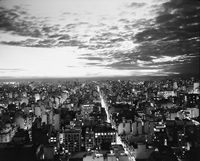
|
 |
Images of the Absence
Imágenes de la Ausencia
|
GERMANY
/ 1998 / Spanish / Color, B/W / 16mm / 89 min
Director, Script, Narration, Producer: German Kral
Photography: Daniel Sponsel, Gustavo Wald
Editing: German Kral, Peter Przygodda
Music: Gerd Baumann, Jens Fischer
Executive Producer: Wolfgang Längsfeld
Production Company, Source: Hochschule für Fernsehen,
und Film München
Abt. III Film und Fernsehspiel, Frankenthaler Straße 23, 81539
München
Phone: 49-89-68957-333 / Fax: 49-89-68957-339
 |
|
German Kral
Born in Buenos Aires in 1968. He has been studying at the Academy
for Television & Film (HFF) in Munich since 1991. His short On
the Edge (1992) won First Prize at the Bienal de Arte in Buenos
Aires and the Sheraton Award at the Antalya Short Film Festival. His
Tango Berlin (1997), co-directed with Florian Gallenberger,
was the German entry to Venice's Biennale in 1997. His filmography
includes The Other One (1991), Tale of the Deserts (1996),
and A Trick of the Light (co-director/co-author, 1993-96).
A Trick of the Light is part of a trilogy done with Wim Wenders
and students of the Munich Film School. 
|
German Kral, who
learned film in Berlin, experienced in his childhood the separation
of his parents and the long absence of his father. The memories of
these influenced his entire way of life. In order to discover the
reasons for his parents' separation and to rediscover himself, he
returned to his homeland of Buenos Aires, Argentina. From its introspective
opening onward, the film serves as the director's travel diary while
illuminating the truth about his past through interviews with his
parents and grandmother. The self-recognition of the Argentine-born
director deepens through elements such as Gardel, the tango, and an
interview with Jorge Luis Borges. The point of access is the search
for self, the memory of trauma, but what emerges here is a full account
of the uncertain emotion called love, of life, old age and of death.
The film depicts extremely personal material, but the themes are indeed
universal. Though it starts with black and white images reminiscent
of Wim Wenders, gradually a blitheness exudes from the screen. The
passionate freshness of the director is pleasing indeed. [Inada Takaki]
Director's
Statement
In 1991 I traveled from Buenos Aires to Germany to study film. Seven
years later, I had to return in order to make this film. Images
of the Absence tells the story of a family, which never became
one: my family.
The film is also a kind of diary of my journey from Germany to Buenos
Aires to be able to understand the reasons for my parents' separation
and for my father's long absence.
Images of the Absence is a film about love and the loss of
love, about growing old and death.
If I dared to tell my story or the story of my parents, it was because
I think that every story has a center in which we are all alike, where
there are no more differences between "my" story and "your"
story. A place where we all find ourselves facing the mystery, the
tragedy, the pain and the beauty of being alive.
I am extremely happy to know that my film will be shown in the country
of my two beloved masters: Ozu and Mizoguchi. |
  |
|
before  next next |
COPYRIGHT:Yamagata International Documentary Film Festival Organizing Committee |